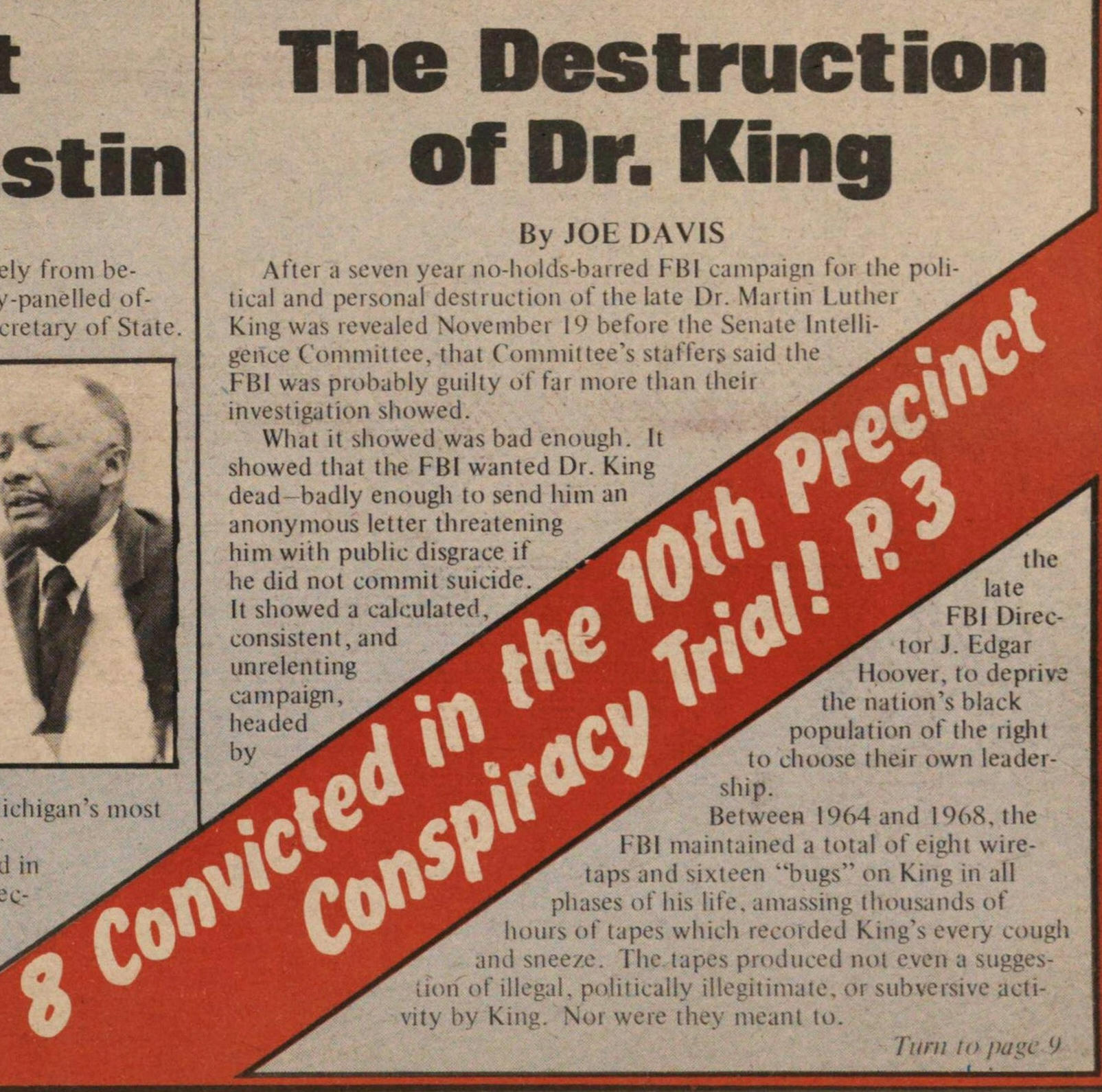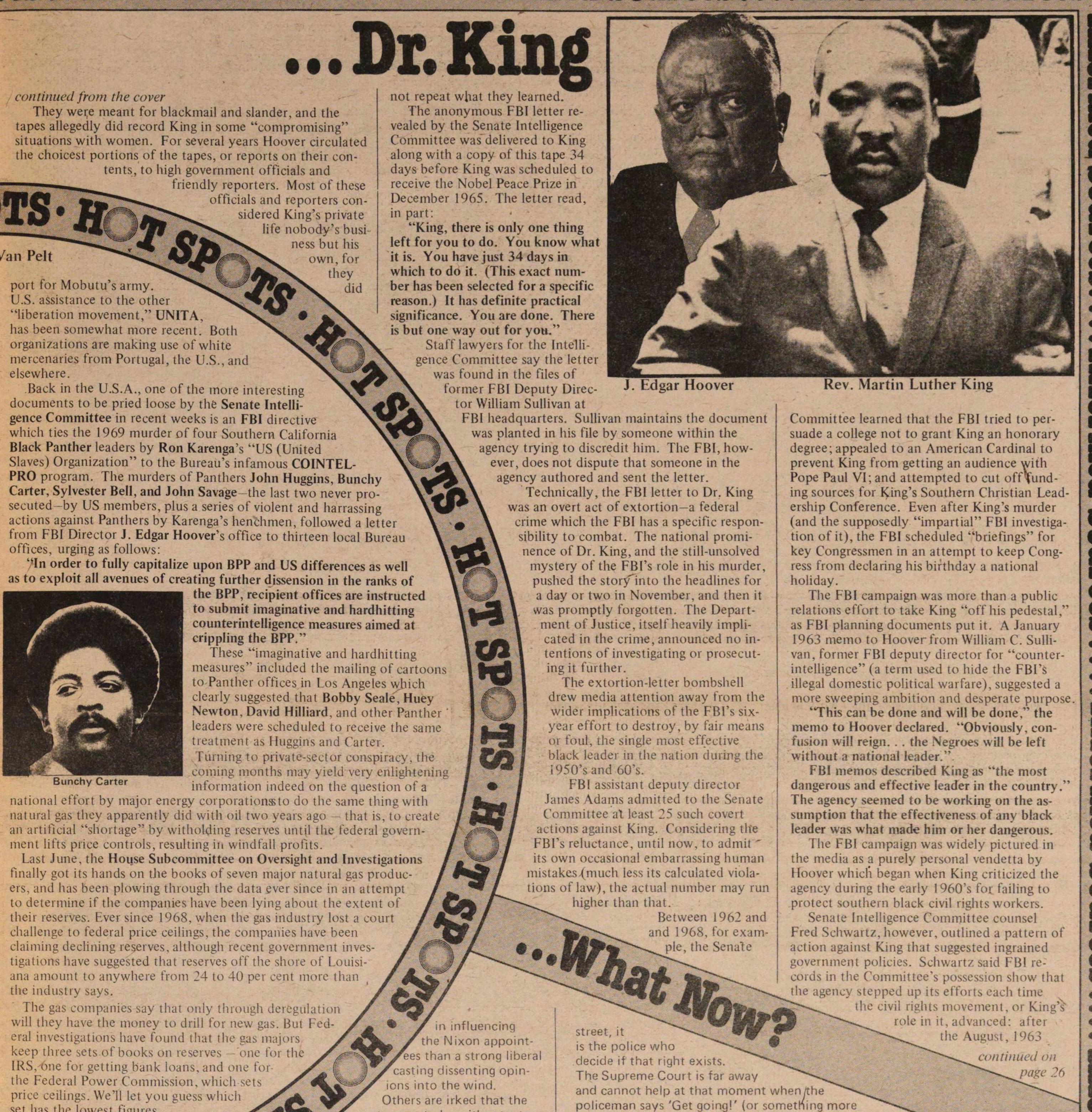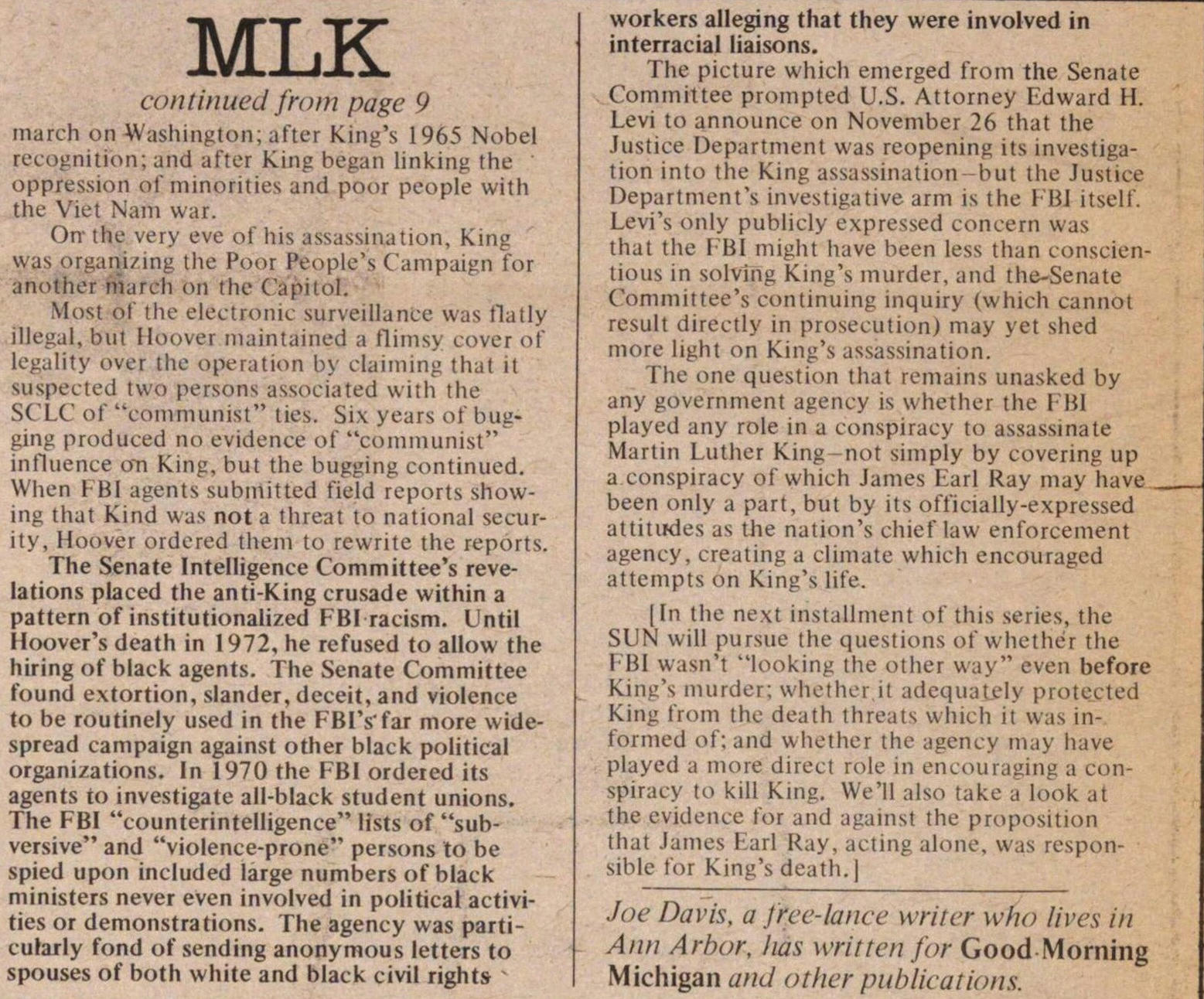The Destruction Of Dr. King



The Destruction of Dr. King
By Joe Davis
After a seven year no-holds-barred FBI campaign for the political and personal destruction of the late Dr. Martin Luther King was revealed November 19 before the Senate Intelligence Committee, that Committee's staffers said the FBI was probably guilty of far more than their investigation showed.
What it showed was bad enough. It showed that the FBI wanted Dr. King dead-badly enough to send him an anonymous letter threatening him with public disgrace if he did not commit suicide. It showed a calculated consistent, and unrelenting campaign, headed by the late FBI FBI Edgar Hoover, to deprive the nation's black population of the right to choose their own leadership.
Between 1964-1968, the FBI maintained a total of eight wiretaps and sixteen "bugs" on King in all phases of his life, amassing thousands of hours of tapes which recorded King's every cough and sneeze. The tapes produced not even a suggestion of illegal, politically illegitimate, or subversive activity by King. Nor were they meant to.
Turn to page 9
...Dr.King continued from the cover
They were meant for blackmail and slander, and the tapes allegedly did record King in some "compromising" situations with women. For several years Hoover circulated the choicest portions of the tapes, or reports on their contents, to high government officials and friendly reporters. Most of these officials and reporters considered King's private life nobody's business but his own, for they did not repeat what they learned. The anonymous FBI letter revealed by the Senate Intelligence Committee was delivered to King along with a copy of this tape 34 days before King was scheduled to receive the Nobel Peace Prize in December 1965. The letter read, in part:
"King, there is only one thing left for you to do. You know what it is. You have just 34 days in which to do it. (This exact number has been selected for a specific reason.) It has definite practical significance. You are done. There but one way out for you."
Staff lawyers for the Intelligence Committee say the letter was found in the files of V former FBI Deputy tor William Sullivan at FBI headquarters. Sullivan maintains the document was planted in his file by someone within the agency trying to discredit him. The FBI, however, does not dispute that someone in the agency authored and sent the letter.
Technically, the FBI letter to Dr. King was an overt act of extortion- a federal crime which the FBI has a specific responsibility to combat. The national prominence of Dr. King, and the still-unsolved mystery of the FBI's role in his murder, pushed the story into the headlines for a day or two in November, and then it was promptly forgotten. The Department of Justice, itself heavily implicated in the crime, announced no intentions of investigating or prosecuting it further.
The extortion-letter bombshell drew media attention away from the wider implications of the FBI's six year effort to destroy, by fair means or foul, the single most effective black leader in the nation during the 1950's and 60's.
FBI assistant deputy director James Adams admitted to the Senate Committee at least 25 such covert actions against King. Considering the FBI's reluctance, until now, to admit its own occasional embarrassing human mistakes (much less its calculated violations of law), the actual number may run - higher than that.
Between 1962 and and 1968, for example, the Senate Committee learned that the FBI tried to persuade a college not to grant King an honorary degree; appealed to an American Cardinal to prevent King from getting an audience with Pope Paul VI; and attempted to cut off funding sources for King's Southern Christian Leadership Conference. Even after King's murder (and the supposedly "impartial" FBI investigation of it), the FBI scheduled "briefings" for key Congressmen in an attempt to keep Congress from declaring his birthday a national holiday.
The FBI campaign was more than a public relations effort to take King "off his pedestal," as FBI planning documents put it. A January 1963 memo to Hoover from William C. Sullivan, former FBI deputy director for "counterintelligence" (a term used to hide the FBl's illegal domestic political warfare), suggested a more sweeping ambition and desperate purpose.
"This can be done and will be done," the memo to Hoover declared. "Obviously, confusion will reign. . . the Negroes will be left without a national leader."
FBI memos described King as "'the most dangerous and effective leader in the country." The agency seemed to be working on the assumption that the effectiveness of any black leader was what made him or her dangerous.
The FBI campaign was widely pictured in the media as a purely personal vendetta by Hoover which began when King criticized the agency during the early 1960's for failing to protect Southern black civil rights workers.
Senate Intelligence Committee counsel Fred Schwartz, however, outlined a pattern of action against King that suggested ingrained government policies. Schwartz said FBI records in the Committee's possession show that the agency stepped up its efforts each time the civil rights movement, or King's role in it, advanced: after the August, 1963
continued on page 26
MLK continued from page 9
march on Washington; after King's 1965 Nobel recognition; and after King began linking the oppression of minorities and poor people with the Viet Nam war.
On the very eve of his assassination, King was organizing the Poor People's Campaign for another march on the Capitol.
Most of the electronic surveillance was flatly illegal, but Hoover maintained a flimsy cover of legality over the operation by claiming that it suspected two persons associated with the SCLC of "communist" lies. Six years of bugging produced no evidence of "communist" influence on King, but the bugging continued. When FBI agents submitted field reports showing that Kind was not a threat to national security, Hoover ordered them to rewrite the reports.
The Senate Intelligence Committee's revelations placed the anti-King crusade within a pattern of institutionalized FBI racism. Until Hoover's death in 1972, he refused to allow the hiring of black agents. The Senate Committee found extortion, slander, deceit, and violence to be routinely used in the FBI far more widespread campaign against other black political organizations. In 1970 the FBI ordered its agents to investigate all-black student unions. The FBI "counterintelligence" lists of "subversive" and "violence-prone" persons to be spied upon included large numbers of black ministers never even involved in political activities or demonstrations. The agency was particularly fond of sending anonymous letters to spouses of both white and black civil rights workers alleging that they were involved in interracial liaisons.
The picture which emerged from the Senate Committee prompted U.S. Attorney Edward H. Levi to announce on November 26 that the Justice Department was reopening its investigation into the King assassination but the Justice Department's Investigative arm is the FBI itself. Levi's only publicly expressed concern was that the FBI might have been less than conscientious in solving King's murder, and the-Senate Committee's continuing inquiry (which cannot result directly in prosecution) may yet shed more light on King's assassination.
The one question that remains unasked by any government agency is whether the FBI played any role in a conspiracy to assassinate Martin Luther King- not simply by covering up a conspiracy of which James Earl Ray may have been only a part, but by its officially-expressed attitudes as the nation's chief law enforcement agency, creating a climate which encouraged attempts on King's life.
[In the next installment of this series, the SUN will pursue the questions of whether the 1 BI wasn't "looking the other way" even before King's murder; whether it adequately protected King from the death threats which it was informed of; and whether the agency may have played a more direct role in encouraging a conspiracy to kill King. We'll also take a look at the evidence for and against the proposition that James Earl Ray, acting alone, was responsible for King's death]
Joe Davis, a free-lance writer who lives in Ann Arbor, has written for Good-Morning Michigan and other publications.
Article
Subjects
Freeing John Sinclair
Old News
Ann Arbor Sun